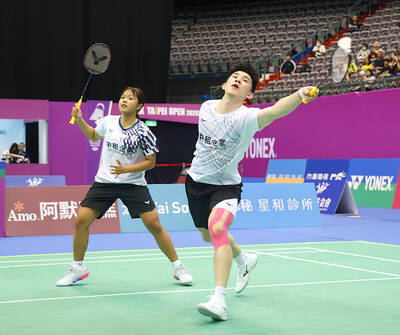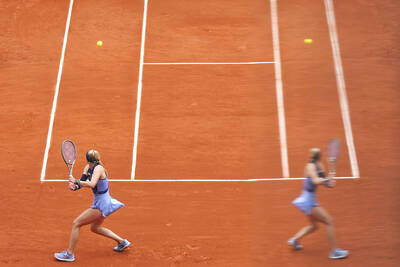Two men pivot and slide in a forest clearing, their bodies weaving before a handful of spectators in what could be a graceful dance except that each waves a machete, blades glinting in tropical sunlight.
The barefoot men are father and son, Alfred and Roland Avril, and are farmers by trade in southern Haiti. However, their passion is machete fencing, an obscure martial art with roots in the Caribbean country’s history of slavery and rebellion.
In the smoky, greenish light under the trees of his property, 70-year-old Alfred, a master of machete fencing, moves back and forth in fluid, trance-like steps. He explains later that his skills have been honed through decades of practice and mystical visions.
“At the moment I am about to fight with the machete, I can see it all unfold in a dream,” he said without further explanation on a recent morning.
This obscure practice that emerged around the Caribbean in the colonial period is gaining new attention thanks to the very modern phenomenon known as Reddit. Videos showing the elder Avril instructing students were posted on the popular Internet site, catching the attention of a Miami-based writer and filmmaker who was quickly hooked by the menacing beauty of the fencing.
“When I found out that there was an actual martial art using the machete and that somehow it was wrapped up in the history of the Haitian revolution, I knew I had to go to Haiti to train,” said Jason Jeffers, one of the founders of the Haitian Machete Fencing Project, which seeks to promote and preserve a vanishing practice that is part sport, part art.
Jeffers is putting the finishing touches on a short, crowd-sourced documentary about Avril called Papa Machete that he is hoping to get into film festivals. He is in early planning stages for a full film, perhaps featuring other machete masters in Haiti’s central Artibonite region, where the tradition is most common. Other project members are organizing summer training sessions with Avril in the southern beach village of Jacmel.
Experts say machete-based martial arts can also be found among people of African descent in other countries, including Colombia and Cuba. Related styles of fighting include “stick-licking” in Barbados and kalenda in Trinidad and Tobago. However, the Haitian tradition is a unique fusion of traditional African stick-fighting and European saber fencing that researchers say can be traced back to the earliest days of Haiti’s slave revolution at the end of the 1700s.
T.J. Desch-Obi, an associate professor of history at New York’s Baruch College who has researched machete fencing, said the art is rooted in combat methods used by the slaves who rose up against their French oppressors in the Haitian revolution of 1791-1804.
“Haiti’s revolution really started with just machetes in the early days of the war when they didn’t have much access to firearms,” said Desch-Obi, author of a 2008 book Fighting for Honor: The History of African Martial Art Traditions in the Atlantic World, which suggests that expertise in machete combat contributed to the success of the slave revolution.
In the 20th century, Haiti’s machete-fighting tradition was kept alive by secret societies that required initiates to learn the art, Desch-Obi said. Over the years he has met about 10 machete masters in Haiti, but the exact number in the country is unknown.
It is imbued, at least in Avril’s version, with some of the esoteric ideas of Voodoo, a blend of West African religions created by slaves during the colonial period. The martial art served mostly as a means of self-defense among people living in the Haitian countryside, where the handy agricultural tool is used for nearly every purpose under the sun.
Michael Rogers, founder of the Haitian Machete Fencing Project, hopes that showcasing the tradition for visitors will help his aging teacher and preserve what remains of the practice passed down through generations. Although Avril lives close to Jacmel, a coastal town that draws tourists, it tends to be practiced by people in communities deep in the countryside.
“I’m also hoping that other masters in other parts of Haiti will come out and show their stuff,” Rogers said in a telephone interview from Britain.
Historically, the rural tradition of machete fencing has been shrouded in secrecy. Initially, Rogers said, Avril would only instruct him behind a wall of woven coconut fronds.
Trying to bring the secretive, rural Haitian martial art to foreigners involves certain trade-offs, but Avril is now eager to share his machete-fighting expertise with anyone who is interested. The former Haitian army drill instructor trained his sons, grandsons and neighbors to carry on his school.
Avril says he has so far instructed about a dozen people from abroad. Novices are instructed on machetes carved out of wood. Students say it takes weeks to graduate to a real machete.
One of Avril’s veteran students is local bar owner Reginald Turnier, who was raised in New York by Haitian parents. He feels like he is unlocking the fighting techniques of his ancestors, and has several small scars on his hands and scalp from early lessons.
“There’s definitely a martial lineage I feel I’m connecting to,” he said.

TIGHT FINISH: Napoli only needed to do the same as or better than Inter, who won their game against Como 2-0 on the same day, leaving Napoli with a one-point lead The two players who Antonio Conte wanted more than any others secured Napoli their second Serie A title in three years on Friday. Scott McTominay scored with an acrobatic bicycle kick before halftime and Romelu Lukaku doubled the lead with a solo goal after the break in the decisive 2-0 home win over Cagliari. Conte became the first coach to win the Italian championship with three different teams. “Everyone contributed to this — but the coach most of all,” Napoli captain Giovanni Di Lorenzo said. “Napoli needed him to get back on top. He’s phenomenal.” Comparing it to his three Serie A titles won

The journey of Taiwan’s badminton mixed doubles duo Ye Hong-wei and Nicole Chan at the Malaysia Masters in Kuala Lumpur came to an end in the semi-finals yesterday after they suffered a 2-0 loss to China’s Feng Yanzhe and Huang Dongping. Ye, 25, and Chan, 20, teamed up last year and are currently ranked No. 23 in the world. The Taiwanese shuttlers took on China’s second seeds in the mixed doubles event, but proved no match for Feng and Huang, losing the match 10-21, 7-21. In the first half of the first game, the pairings were neck and neck at 6-7 until Ye

SSC Napoli coach Antonio Conte has dragged the team back from disaster and restored them to the top of Italian Serie A, but his future at the Scudetto winners is in doubt even after a triumphant season. The fiery 55-year-old has exceeded preseason expectations and bolstered his reputation as a serial winner by guiding Napoli to their fourth Scudetto, and second in three seasons. However, he might well be on his way in the summer after just one season at the helm as his charged relationship with Napoli owner Aurelio De Laurentiis has simmered throughout the campaign. Conte has said

Carlos Alcaraz on Monday powered into the French Open second round with a resounding win to start his title defense, while world No. 1 Jannik Sinner and three-time defending women’s champion Iga Swiatek also progressed at Roland Garros. Four-time Grand Slam champion Alcaraz struck 31 winners in a 6-3, 6-4, 6-2 victory over Italian qualifier Giulio Zeppieri and is to face Hungary’s Fabian Marozsan in round two. Alcaraz is now on an eight-match winning streak at the French Open and also took Olympic silver at Roland Garros last year, losing the final to Novak Djokovic. “The first round is never